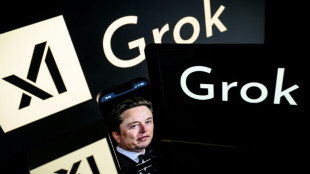-
 Swiatek wins in 58 minutes as Poland reach United Cup semis
Swiatek wins in 58 minutes as Poland reach United Cup semis
-
Grok limits AI image editing to paid users after nudes backlash

-
 Ski great Hirscher pulls out of Olympics, ends season
Ski great Hirscher pulls out of Olympics, ends season
-
Kyiv mayor calls for temporary evacuation after Russian strikes

-
 'War is back in vogue,' Pope Leo says
'War is back in vogue,' Pope Leo says
-
Storms pummel northern Europe causing travel mayhem and power cuts

-
 France has right to say 'no' to US, Paris says
France has right to say 'no' to US, Paris says
-
TikTok drives 'bizarre' rush to Prague library's book tower

-
 EU countries override France to greenlight Mercosur trade deal
EU countries override France to greenlight Mercosur trade deal
-
Russia joins Chinese, Iran warships for drills off S.Africa

-
 Stocks rise ahead of US jobs data and key tariffs ruling
Stocks rise ahead of US jobs data and key tariffs ruling
-
'All are in the streets': Iranians defiant as protests grow

-
 Kurdish fighters refuse to leave Syria's Aleppo after truce
Kurdish fighters refuse to leave Syria's Aleppo after truce
-
Grok turns off AI image generation for non-payers after nudes backlash

-
 Germany factory output jumps but exports disappoint
Germany factory output jumps but exports disappoint
-
Defiant Khamenei insists 'won't back down' in face of Iran protests

-
 Russian strikes cut heat to Kyiv, mayor calls for temporary evacuation
Russian strikes cut heat to Kyiv, mayor calls for temporary evacuation
-
Switzerland holds day of mourning after deadly New Year fire

-
 Trump says US oil pledged $100 bn for Venezuela ahead of White House meeting
Trump says US oil pledged $100 bn for Venezuela ahead of White House meeting
-
Hundreds of thousands without power as storms pummel Europe

-
 Man City win race to sign forward Semenyo
Man City win race to sign forward Semenyo
-
Experts say oceans soaked up record heat levels in 2025

-
 'Would be fun': Alcaraz, Sinner tease prospect of teaming up in doubles
'Would be fun': Alcaraz, Sinner tease prospect of teaming up in doubles
-
Man City win race to sign Semenyo

-
 Chinese AI unicorn MiniMax soars 109 percent in Hong Kong debut
Chinese AI unicorn MiniMax soars 109 percent in Hong Kong debut
-
Iran rocked by night of protests despite internet blackout: videos

-
 Stocks mixed ahead of US jobs, Supreme Court ruling
Stocks mixed ahead of US jobs, Supreme Court ruling
-
Swiatek romps to United Cup victory in 58 minutes

-
 Procession of Christ's icon draws thousands to streets of Philippine capital
Procession of Christ's icon draws thousands to streets of Philippine capital
-
Every second counts for Japan's 'King Kazu' at 58

-
 Syria announces ceasefire with Kurdish fighters in Aleppo
Syria announces ceasefire with Kurdish fighters in Aleppo
-
Russia hits Ukraine with hypersonic missile after rejecting peacekeeping plan

-
 Hundreds of thousands without power as Storm Goretti pummels Europe
Hundreds of thousands without power as Storm Goretti pummels Europe
-
Asian stocks mixed ahead of US jobs, Supreme Court ruling

-
 Scores without power as Storm Goretti pummels Europe
Scores without power as Storm Goretti pummels Europe
-
Sabalenka gets revenge over Keys in repeat of Australian Open final

-
 Fresh from China, South Korea president to visit Japan
Fresh from China, South Korea president to visit Japan
-
Injured Kimmich to miss icy Bundesliga return for Bayern

-
 Rybakina has little hope of change to tennis schedule
Rybakina has little hope of change to tennis schedule
-
Osimhen, Nigeria seek harmony with Algeria up next at AFCON

-
 US immigration agent's fatal shooting of woman leaves Minneapolis in shock
US immigration agent's fatal shooting of woman leaves Minneapolis in shock
-
After fire tragedy, small Swiss town mourns 'decimated generation'

-
 Switzerland mourns Crans-Montana fire tragedy
Switzerland mourns Crans-Montana fire tragedy
-
Russia bombards Kyiv after rejecting peacekeeping plan

-
 Crunch time for EU's long-stalled Mercosur trade deal
Crunch time for EU's long-stalled Mercosur trade deal
-
Wawrinka gets Melbourne wildcard but Kyrgios to play doubles only

-
 Asian stocks rally ahead of US jobs, Supreme Court ruling
Asian stocks rally ahead of US jobs, Supreme Court ruling
-
'Sever the chain': scam tycoons in China's crosshairs

-
 Bulls-Heat NBA game postponed over 'moisture' on court
Bulls-Heat NBA game postponed over 'moisture' on court
-
Arsenal's Martinelli 'deeply sorry' for shoving injured Bradley

Boomers: Selfish or Scapegoats?
The debate over whether the Baby Boomer generation—those born between 1946 and 1964—deserves the label of "the most selfish generation in history" has intensified in recent years. Critics argue that Boomers have prioritised their own comfort and prosperity at the expense of future generations, while defenders point to their contributions to social progress and economic growth. This article explores both sides of the argument, drawing on economic, social, and cultural factors to assess the validity of the claim.
A Generation of Prosperity
The post-World War II era was a time of unprecedented economic growth, particularly in Western nations. Boomers grew up in a period of relative stability and prosperity, benefiting from expanding educational opportunities, affordable housing, and a booming job market. This generation was the first to enjoy the fruits of modern consumer culture, with access to new technologies, healthcare advancements, and a welfare state that provided a safety net. However, this prosperity has been criticised as a double-edged sword. While Boomers thrived, they are accused of failing to address long-term challenges such as climate change, economic inequality, and the sustainability of social security systems. The argument goes that their focus on short-term gains has left younger generations—particularly Millennials and Generation Z—facing a future of environmental degradation, housing crises, and precarious employment.
The Burden of Debt
One of the most frequently cited examples of Boomer selfishness is their approach to public debt. Over the past few decades, national debts have soared in many countries, driven by policies that prioritised tax cuts, increased spending on entitlements, and economic stimulus measures. Critics argue that Boomers, who have held political and economic power during this period, have been complicit in passing on this financial burden to future generations. The rising cost of healthcare, pensions, and social security, combined with stagnating wages for younger workers, has fuelled resentment. In some nations, national debt has increased dramatically since the turn of the century, a period during which Boomers dominated leadership positions. This fiscal irresponsibility, some argue, reflects a generational disregard for the future.
The Housing Divide
Housing is another area where Boomers are accused of hoarding wealth. In many developed countries, property prices have skyrocketed, making homeownership increasingly unattainable for younger generations. Boomers, who bought homes when prices were relatively low, have seen their property values soar, creating a wealth gap that is difficult for Millennials and Gen Z to bridge. Over the past few decades, average house prices have risen significantly while wages have remained largely stagnant. This has led to accusations that Boomers have pulled up the ladder behind them, benefiting from policies that favoured property ownership while younger generations are left renting or struggling to save for deposits.
A Legacy of Progress
However, it would be unfair to paint the entire generation with the same brush. Boomers have also been responsible for significant social progress. The civil rights movements of the 1960s and 1970s, which fought for racial equality, gender rights, and LGBTQ+ inclusion, were largely driven by Boomer activists. Their contributions to technology, healthcare, and education have also been transformative. The digital revolution, which laid the foundation for the modern internet and communication technologies, was spearheaded by Boomer innovators. Moreover, many Boomers have engaged in philanthropy and community service, challenging the notion that they are universally selfish.
Generational Perceptions
Another important factor to consider is the role of generational differences in shaping perceptions of selfishness. Younger generations, facing economic uncertainty and environmental crises, may view Boomers' actions through a lens of frustration. However, it is worth noting that every generation has faced criticism from its successors. The Silent Generation, who preceded the Boomers, were often derided for their conformity and conservatism, while Millennials have been labelled as entitled and overly reliant on technology. This cyclical nature of generational criticism suggests that the "selfish" label may be more a reflection of changing societal values than an objective truth.
Structural Influences
Furthermore, the accusation of selfishness overlooks the structural factors that have shaped Boomer behaviour. The economic policies of the late 20th century, particularly the rise of neoliberalism, encouraged individualism and short-term thinking. Boomers, like all generations, were influenced by the prevailing ideologies of their time. The shift towards deregulation, privatisation, and globalisation was not solely a Boomer creation but a broader political and economic trend. To single out Boomers as uniquely selfish ignores the complex interplay of historical forces that have shaped modern society.
Conclusion
In conclusion, while there is evidence to suggest that the Boomer generation has benefited disproportionately from economic and social conditions, labelling them as "the most selfish generation in history" is an oversimplification. Their contributions to social progress and innovation cannot be ignored, nor can the structural factors that have influenced their behaviour. The intergenerational debate is likely to continue, but it is essential to approach it with nuance, recognising that each generation operates within the constraints and opportunities of its time.

Germany's Anti-Woke Tide

Demographic Collapse Crisis

Israel's War on Iran's Ayatollahs

Israel-Iran: USA Strikes

Iran: Allies abandoned

Saudi Arabia's Economic Crisis

Orban and Putin's Shadow Deal

Ukraine's Drones Bleed Russia

California's Economy: Not Broken

North Korea Infiltrates Economy

Malaysia's Strategic Ascent




